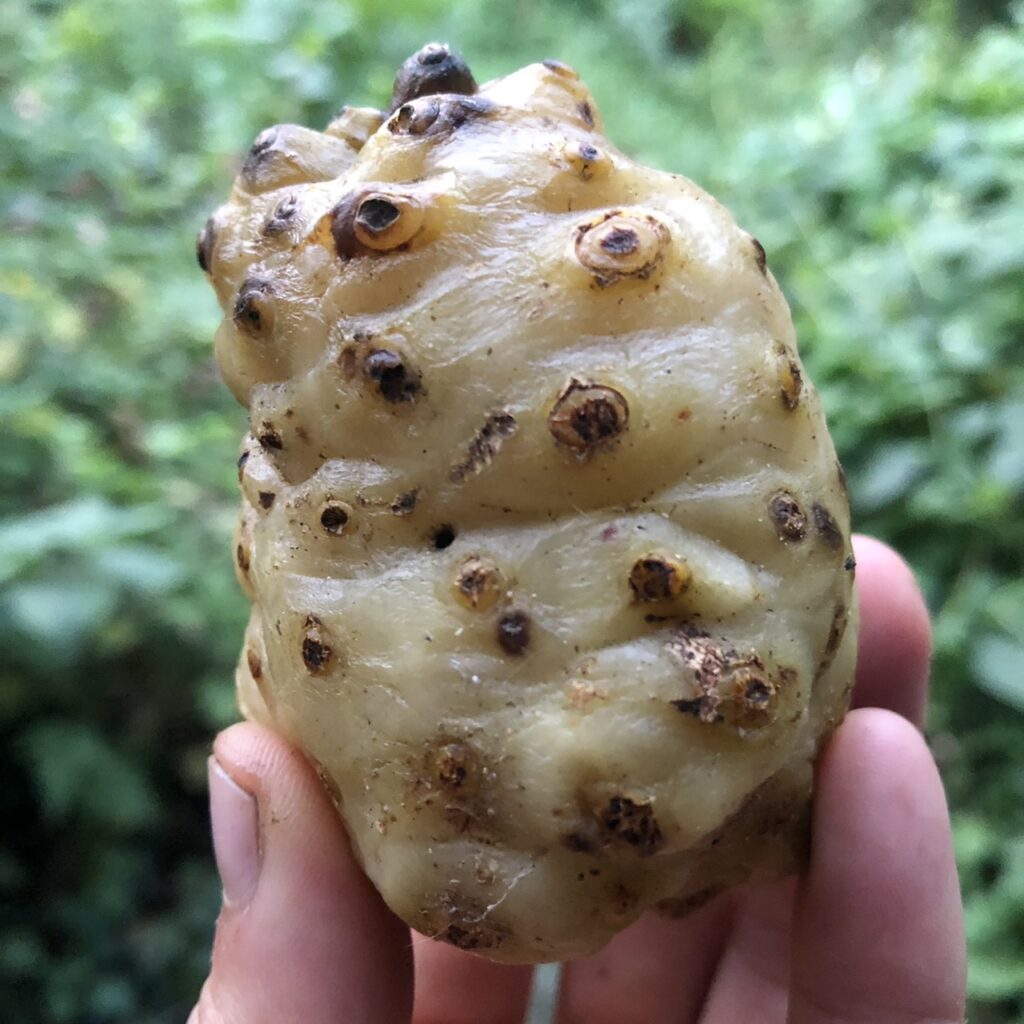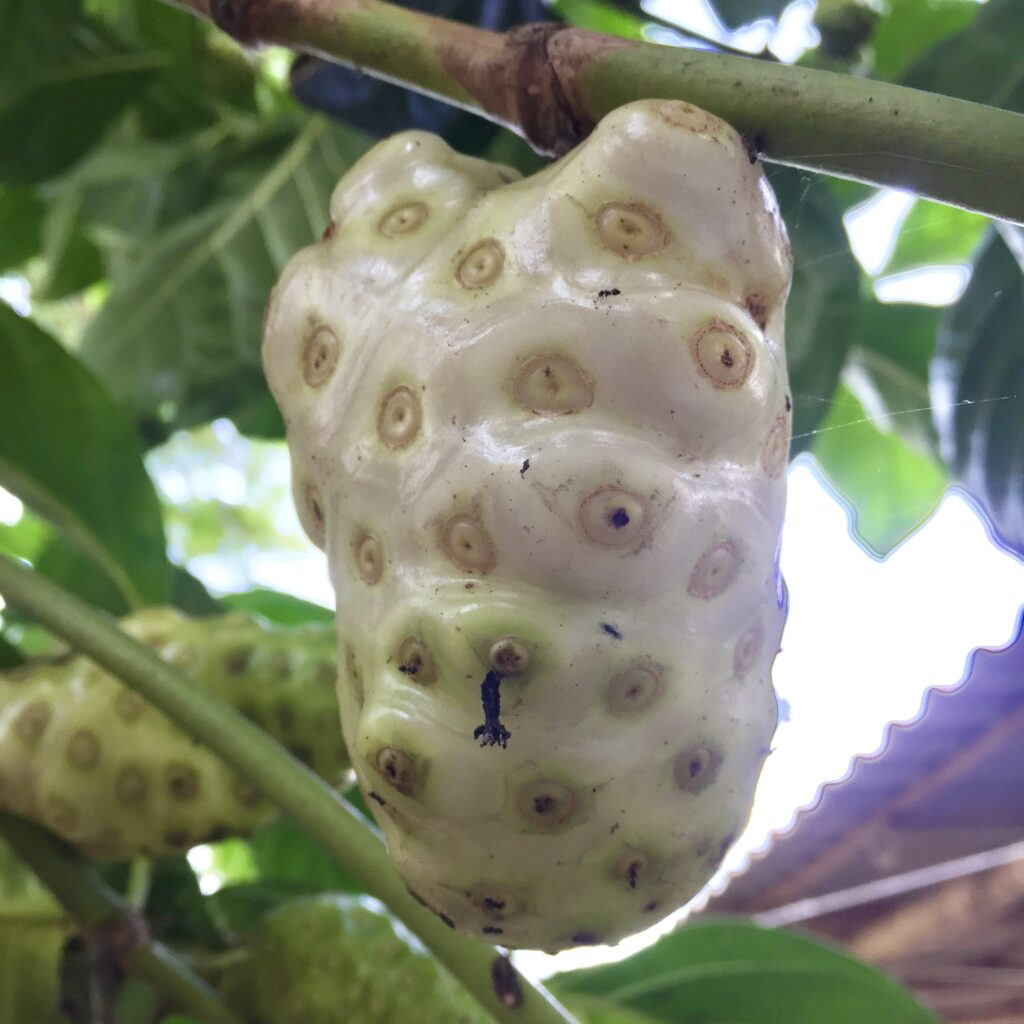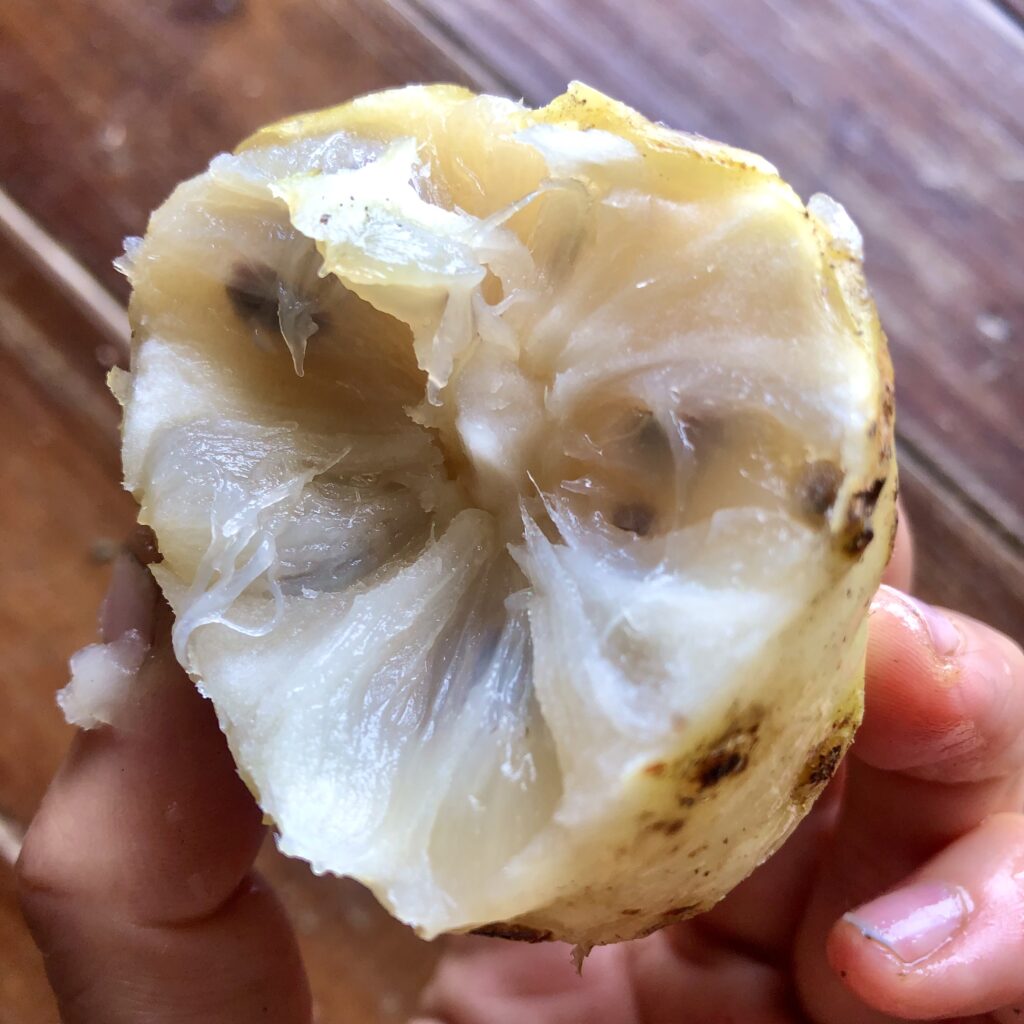Morinda citrifolia is a small tree in the Rubiaceae, or coffee family. It is commonly called noni, Indian mulberry, or cheese fruit. It is native to the South Pacific. Today, noni is cultivated throughout the tropics and is grown commercially in Latin America, Florida, and the West Indies.
Noni produces edible fruits with thin green skin. As they ripen, they become soft, the skin turns a whiteish color, and their characteristic “stinky blue cheese” aroma intensifies.
Noni has a long been appreciated as a food and medicine among traditional cultures, who utilized all parts of the plant for cough, colds, pain, arthritis, burns, headache, wounds, skin infections, intestinal worms, liver disease, and more (Ali et al., 2016; Yashaswini et al., 2014).
The seed oil has been used topically to treat arthritis and on the scalp, as an insecticide. In Hawaii, noni has been used externally for swelling, sprains, bruises and wounds (Ali et al., 2016)
In Polynesia, Australia & India, noni is utilized as a dye, producing various shades including red, purple and yellow (Ali et al., 2016).
Both ripe & and unripe noni fruits have significant antioxidant activity (Chan-Blanco et al., 2005). However, the antioxidant content of fermented noni juice varies by fermentation time. With prolonged fermentation, the antioxidant levels decrease gradually (Guo et al., 2020).
There is a great deal of modern research that shows the benefits of noni for preventing and treating a variety of health issues. One study found that healthy participants who drank 300ml of noni fruit juice daily had significantly reduced adverse events, including headache, cough, nausea, nasal discharge, vomiting, as well as upper respiratory and urinary tract infections (Ali et al., 2016).
Noni promotes healthy menstruation, and can ease period cramps. Drinking noni juice may also be helpful for menopausal women as it improves mood & energy and may prevent osteoporosis (Ali et al., 2016).

Noni has an anti-inflammatory effect. The plant root extract is an antispasmodic and a vasodilator (Ali et al., 2016).
Noni fruit has immunostimulant and immunomodulatory properties. A two month pilot study found that noni juice increased adaptive immune system activity by 32% and innate immune system activity by 30% while decreasing oxidative stress in the body by 19% (Ali et al., 2016).
Noni helps to prevent the build up plaque on the walls of arteries, which can cause life threatening issues like heart attack & stroke. The fruit, roots, and leaves of M. citrifolia have an antidyslipidemic effect, and have been shown to reduce total cholesterol and triglyceride levels in animal studies. Dyslipidemia (elevated LDL or low HDL cholesterol) is another risk factor for cardiovascular disease and stroke (Ali et al., 2016).
Noni lowers high blood pressure and cholesterol. In a study where participants drank noni juice daily, cholesterol, LDL, and triglycerides were reduced and HDL was increased. A month long clinical trial on heavy smokers with borderline high cholesterol levels had similar findings, indicating noni may be helpful for preventing heart disease in heavy smokers (Ali et al., 2016).
Noni has long been utilized for digestive problems, including indigestion, diarrhea, constipation, gastric ulcers and intestinal parasites. Noni fruit juice reduces the inflammatory response involved in inflammatory bowel disease (IBS) and can be used to help control inflammation of the intestines & colon that cause issues like colitis (Coutinho de Sousa, et al., 2017).
Research has found that fermented noni juice may have hypoglycemic and hepatoprotective properties (Nayak, et al.). One study found regular intake of fermented noni juice helped to significantly decrease fasting glucose of diabetic rats (Ali et al., 2016).
Another study showed that fermented noni juice protected the liver from alcohol damage and helped to prevent acute liver injury (Guo et al., 2020). A study on rats found that drinking noni juice reversed acute liver injury and protected the liver from damage due to exposure to toxins (Ali et al., 2016).
Animal studies indicate that noni juice may have the potential to help treat psychiatric disorders. Research has also shown that noni is a natural MAO (both MAO-A & MAO-B) inhibitor, which can help to ease depression and anxiety (Ali et al., 2016).
A study on mice found that noni juice helped protect the brain from cognitive function impairment due to stress. Another animal study found that consuming noni juice helped to protect the brain from damage caused by reduced blood flow and oxygen. Further research into these neuroprotective effects concluded that noni has the potential to prevent and treat Alzheimer’s disease (Ali et al., 2016).
Noni has also been shown to ease osteoarthritis. Participants in a trial reported significant improvement in pain and mobility symptoms after drinking 3 oz of noni juice per day (Ali et al., 2016).
Numerous studies indicate that noni has promising anti-tumor and cancer fighting effects. Research has showed that constituents in the roots inhibited the growth of human lung and colon cancer cells. In-vivo and on-vitro studies found noni, (among other fruits) had both preventative and curative effects on esophageal cancer in rats. Noni juice treatments on rats & mice were shown to significantly decrease the size of cancerous breast tumors and inhibit their growth (Ali et al., 2016).
Noni is also a good supplement to cancer treatments. An animal study showed that an alcoholic noni extract helped protect healthy tissue from side effects of certain cancer drugs. In this case, noni showed significant kidney protective properties. Noni has also been found to have an additive effect when used in combination with chemotherapy drugs (Ali et al., 2016).
Noni leaf extract has been shown to have antimicrobial activity against various infectious diseases. A methanol extract of noni fruit has antifungal effects. Constituents in noni root have been shown to have antiviral activity (Ali et al., 2016).
One study found that noni juice, when combined with good oral hygiene, can be helpful for treating gingivitis and periodontitis (Ali et al., 2016).
Noni has a long history of use in skin care applications. Indigenous folk medicine utilized the leaves as an emollient and for inflammations, burns, and insect stings. In the Pacific Islands, the fruits were used for boils and skin ulcers (West and Sabin, 2012).
Applying noni juice, seed oil, and leaf juice reduces fine lines & wrinkles and improves skin elasticity & firmness (Ali et al., 2016). One clinical trial showed that noni leaf extracts helped to protect skin against damage due to UV exposure and may be helpful in preventing premature skin aging (West and Sabin, 2012).
Several studies have demonstrated that daily topical use of noni fruit juice or noni formulations (including a cream containing noni ethanol extract) improved skin firmness & elasticity by up to around 43% and significantly reduced the severity of wrinkles (West, 2018).
Research indicates that noni juice improves skin health due to its antioxidant content, which boosts collagen and helps to prevent the breakdown of collagen in the skin. This effect enhances wound healing and improvement in the overall appearance of skin, due to increased firmness & elasticity (West, 2018). Noni leaf extract has also been found to have wound healing properties (Ali et al., 2016).
In a six week clinical trial using a noni skin care regimen, 96% of participants had a reduction of fine lines and wrinkles by the end of the trial and many had visible results, including improved skin tone and appearance, within just 2 weeks (West and Sabin, 2012).
Noni seed extract has also been evaluated for use in cosmetic products and was found to be useful for preventing and treating pigmented spots on the skin and wrinkles (Matsuda et al., 2013).
Fermented noni taken orally has been shown to significantly improve eczema lesions and itchiness. It also helped to balance inflammatory immune response, helping to reduce further flare ups (Kim et al., 2020).

There have been concerns raised about potential hepatotoxicity of noni preparations due to their potential carcinogenic anthraquinone content. Studies by the US National Toxicology Program found that anthraquinones caused cancer of the kidney, urinary bladder, liver, and thyroid in rats and mice. These compounds have been found in the wood, stems, and roots of M. citrifolia.
Safety studies have found that regularly consuming noni juice is not likely to cause toxicity. A clinical trial found that drinking noni juice daily had no adverse effects (West et al., 2018).
Bussmann et al.’s study of specific noni preparations found that “noni fruit puree from which seeds and skin fragments had been removed as well as products (juice as well as capsules) produced from such puree had no detectable amounts of any anthraquinones. In contrast, products that did contain fruit skin or leaf material did contain partly significant amounts of all anthraquinones in all cases” (2013).
Bussmann et. al, conclude, “to alleviate potential safety concerns, we suggest that commercial noni products in the market, whether fermented or unfermented juice or powder, should be derived only from fully ripe noni fruits, and that any seed material needs to be removed during the production process.” (Bussmann, et al.)
Noni can be processed in a variety of ways. Juice, tincture, and capsules are popular ways to consume noni for its health benefits. Noni fruit can also be used in various culinary creations, such as salad dressings, curries, smoothies, fruit leather, and more. I’ll be going more into depth about several medicinal and culinary preparations in an upcoming post.
It should be noted that noni is contraindicated in some cases. Noni should be avoided if pregnant or breastfeeding (Tierra 170-172). One study found that the drinking larger amounts of noni juice during pregnancy delayed ossification and may contribute to skeleton alteration in the fetus (Ali et al., 2016).
Noni juice is also not recommended for patients who have liver and kidney dysfunctions because it is rich in potassium and can lead to hyperkalemia (Ali et al., 2016).
Noni is very helpful for a number of health issues and makes a wonderful tonic for boosting overall vitality. While some may find its aroma off-putting, this stinky little fruit is certainly a valuable part of the modern herbal pharmacopoeia.

References
Ali, M. , Kenganora, M., and Manjula, S.N. (2016). “Health Benefits of Morinda citrifolia (Noni): A Review.” Pharmacognosy Journal, 8(4), 321-334. DOI: 10.5530/pj.2016.4.4. https://phcogj.com/sites/default/files/10.5530pj.2016.4.4.pdf
Bussmann, R.W., Hennig, L., Giannis, A., Ortwein, J., Kutchan, T.M., and Feng, X. (2013). Anthraquinone Content in Noni (Morinda citrifolia L.). Evidence Based Complementary Alternative Medicine. doi: 10.1155/2013/208378
Chan-Blanco, Y., Vaillant, F., Perez, A.M., Reynes, M., Brat, P. and C. Z ̇Òiga, C.Z. (2005). Microbiological and anti-oxidant Properties during ripening of Noni Fruits (Morinda citrifolia). Information and Technology for Sustainable Fruit and Vegetable Production, 5. Accessed via: https://agritrop.cirad.fr/529820/1/document_529820.pdf
Coutinho de Sousa, B. Machado, J.R., Vinicius da Silva, M., Alvares da Costa, T., Lazo-Chica, J.E., Degasperi, T.P., […] and Freire Oliveira, C.J. (2017). Morinda citrifolia (Noni) Fruit Juice Reduces Inflammatory Cytokines Expression and Contributes to the Maintenance of Intestinal Mucosal Integrity in DSS Experimental Colitis. Mediators of Inflammation. https://doi.org/10.1155/2017/6567432
Fahs, Barbara. “Noni Needn’t Taste Nasty.” Proceedings of the 2002 Hawai‘i Noni Conference, S.C. Nelson (ed.), University of Hawaii at Manoa, College of Tropical Agriculture and Human Resources, 2003, 17-19. Accessed via: https://www.ctahr.hawaii.edu/noni/Downloads/noni17_19.pdf
Guo, M., Mao, B., Sadiq, F.A., Hal, Y., Cui, S., Yi, M. […], and Zhao, J. (2020). Effects of noni fruit and fermented noni juice against acute alcohol induced liver injury in mice. Journal of Functional Foods, 70. https://doi.org/10.1016/j.jff.2020.103995
Kim, S.H., Seong, G.S., and Choung, S.Y. (2020). Fermented Morinda citrifolia (Noni) Alleviates DNCB-Induced Atopic Dermatitis in NC/Nga Mice through Modulating Immune Balance and Skin Barrier Function. Nutrients, 12(1): 249. doi: 10.3390/nu12010249
Matsuda, H., Masuda, M., Murata, K., Abe, Y., and Uwaya, A. (2013). Study of the Anti-Photoaging Effect of Noni (Morinda citrifolia). Melanoma. Accessed via: https://www.intechopen.com/chapters/42349
Nelson, S.C. and Elevitch, C.R. (2006). Noni: The Complete Guide for Consumers and Growers. Permanent Agriculture Resources. Accessed via: https://www.ctahr.hawaii.edu/uhmg/downloads/2006-Noni-The-Complete-Guide-Nelson-Elevitch.pdf
Shivananda Nayak, B., Marshall, J.R., Isitor, G., and Adogwa, A. (2011). Hypoglycemic and Hepatoprotective Activity of Fermented Fruit Juice of Morinda citrifolia (Noni) in Diabetic Rats. Evidence-Based Complementary and Alternative Medicine. https://doi.org/10.1155/2011/875293
Tierra, Michael. The Way of Herbs.(1998). Pocket Books.
Wang, Z., Dou, R., Yang, R., Cai, K., Li, C., and Li, W. (2021). Changes in Phenols, Polysaccharides and Volatile Profiles of Noni (Morinda citrifolia L.) Juice during Fermentation.” Molecules ,26(9): 2604. https://www.mdpi.com/1420-3049/26/9/2604
West, B. (2018). The Influence of Morinda citrifolia (Noni) Fruit Juice on Collagen Deposition in the Skin: A Mini-review. Journal of Biosciences and Medicines, 6:1-10. https://doi.org/10.4236/jbm.2018.69001
West, B., Deng, S., Isami, F., Uwaya, A., and Jensen, C.J. (2018). The Potential Health Benefits of Noni Juice: A Review of Human Intervention Studies. Foods, 7(4): 58. DOI: 10.3390/foods7040058
West, B. and Sabin, R.A. (2012). Efficacy of a Morinda citrifolia Based Skin Care Regimen.” Current Research Journal of Biological Sciences 4(3): 310-314. Accessed via: https://www.researchgate.net/profile/Brett-West/publication/267201851_Efficacy_of_a_Morinda_citrifolia_Based_Skin_Care_Regimen/links/55ddcd6008ae7983897d0715/Efficacy-of-a-Morinda-citrifolia-Based-Skin-Care-Regimen.pdf?origin=publication_detail
Yashaswini, S., Venugopal, C.K., Hedge, R.V., and Mokashi, A.N. (2014). “Noni: A New Medicinal Plant for the Tropics.” African Journal of Plant Science, 8(5), 243-247. Accessed via: https://academicjournals.org/article/article1401270399_Yashaswini%20et%20al.pdf

